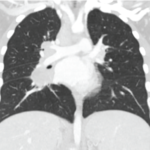This guideline provides evidence-based recommendations on the use of vaccinations in children and adults with rheumatic and musculoskeletal diseases. It includes expanded indications for some vaccines, as well as guidance on whether to hold immunosuppressive medications or delay vaccination to maximize vaccine immunogenicity and efficacy.
The ACR/CHEST ILD Guidelines in Practice, a video
In collaboration with the American College of Chest Physicians, the ACR released two new comprehensive guidelines aimed at improving the screening, monitoring, and treatment of patients with interstitial lung disease (ILD) secondary to systemic autoimmune rheumatic diseases (SARDs). Recently, Sindhu R. Johnson, MD, PhD, professor of medicine at the University of Toronto, Canada, director of the Toronto Scleroderma Program and principal investigator for the guideline, and Elana J. Bernstein, MD, MSc, Florence Irving associate professor of medicine in the Division of Rheumatology at Columbia University, New York City, and co-first author, presented a webinar to talk about how the guidelines were developed and present some of the recommendations and their rationale: Watch the recording now!
What to Expect in Healthcare Policy from the 2023 State Legislative Sessions
With 2023 state legislative sessions underway, early prevailing themes may forecast areas where we will see gains this year. Key issues include utilization management, copay accumulator bans, white bagging and pharmacy benefit manager reform.

Rheumatology Research Foundation Supports High-Risk, High-Reward Ideas
Now in the second year of his 2021–2023 term as the Rheumatology Research Foundation president, V. Michael Holers, MD, a professor of medicine and immunology and the Smyth Professor of Rheumatology at the University of Colorado, Denver, is looking forward to fortifying and expanding the Foundation’s missions in the framework of its new strategic plan.

ACR Convergence 2022 Closing Session Discusses Research Highlights
PHILADELPHIA—Expert panelists gathered in the closing session at ACR Convergence 2022 to give their take on what they saw as some of the most notable research findings and other insights to come out of the meeting, touching on a number of topics on the leading edge of the field. COVID-19 Prophylaxis & Vaccinations Alfred Kim,…

3 AC&R Study Summaries: Treat to Target in Gout, Response to Biologics in Patients with JIA, & Rehabilitation Dose in Adults with RA
Treat to Target in Gout Monitoring & achievement of target serum urate levels By Jing Li & Gabriela Schmajuk, MD, MS Why was this study done? The ACR’s 2020 guideline for the management of gout recommends using a treat-to-target (T2T) approach to lower serum urate (SU). Using the ACR’s RISE registry, we examined the use…

RheumMadness 2023: the All-Star Season
RheumMadness is back for its third season, and everyone who is crazy about rheumatology is welcome to play. That includes practicing rheumatologists, fellows, residents, medical students, advanced practice providers, other healthcare professionals and patients. Basically, if you are reading this article, you can play RheumMadness. RheumMadness is an online tournament in which a bracket of…
Healthcare Policy Prospects in the 118th Congress
The U.S. government remains divided. Democrats hold the White House and the Senate by one vote, and Republicans lead the House. Amid this division, the ACR is watching possible areas to advance healthcare legislation. Meet the committees and members with the largest jurisdiction over healthcare policy.
Reform of Medicare Payment System Needed to Maintain Patient Care, ACR Says
In a joint letter, the ACR urges Congress to undergo comprehensive reform of the Medicare payment system and seek long-term payment solutions that will allow clinicians to continue to care for Medicare patients.
How Long Should Methotrexate Be Held Following Seasonal Vaccinations?
Vaccinations against preventable diseases, including seasonal influenza, are strongly recommended for patients with rheumatoid arthritis (RA), who are at increased risk of infections as a result of underlying immune dysfunction and treatment-induced immunosuppression. Park et al. conducted this clinical trial to investigate whether discontinuing methotrexate for one week after seasonal influenza vaccination is noninferior to discontinuing it for two weeks after vaccination in patients with RA.
CMS Announces Timeline for Drug Negotiations
This month, the CMS will begin steps to develop a drug pricing negotiation process as allowed by the Inflation Reduction Act. The ACR plans to participate in public comment opportunities.
- « Previous Page
- 1
- …
- 34
- 35
- 36
- 37
- 38
- …
- 251
- Next Page »
